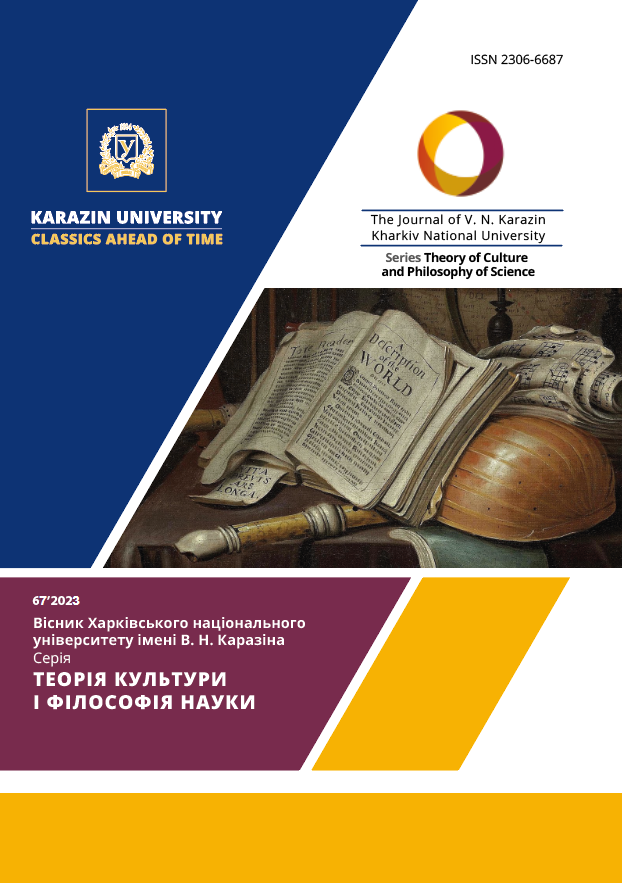KNOWLEDGEON THE MARKET: THE DILEMMA OF SCIENCE POPULARIZATION
Abstract
Modern science is complicated and redundant for ordinary people. In the rapidly evolving landscape of modern science, the intricacies of research and discovery often find themselves distilled into digestible forms for the general public. This simplification, however, may not be sufficient in a world where science competes for attention in a marketplace flooded with information. The article delves into the shifting dynamics of science popularization, transcending traditional educational roles and venturing into the realm of marketing. In this era, science is not merely a body of knowledge; it is a brand, and its promotion necessitates a blend of credibility and emotional appeal. The narrative explores how the popularization of science is undergoing a transformative shift, moving beyond the educational sphere and embracing marketing strategies. The article contends that, in order to gain public trust, science is increasingly presented as a marketable "product" with the tagline “Confirmed by science”. This phenomenon reflects a departure from conventional educational approaches, as science seeks to inspire confidence in consumers akin to commercial products.Moreover, the article examines the role of pop culture in reinforcing trust in rational knowledge through emotional connections. It explores how honorable names, ethical considerations, and the self-evident nature of scientific findings contribute to the creation of a new mythology around science. In this context, science becomes more than a set of facts; it transforms into a narrative that resonates with individuals on a deeper, emotional level.The discussion within the article is framed around the ambivalence inherent in these modern methods of science popularization. While the blending of science and marketing may enhance accessibility and engagement, it also raises questions about the potential distortion of scientific information and the ethical implications of turning knowledge into a marketable commodity. The article aims to stimulate reflection on the evolving relationship between science, marketing, and popular culture in shaping public perceptions of scientific endeavors. It turns scientific knowledge into new mythology. This article is devoted to ambivalent modern methods of science popularizing.
Downloads
References
Andrew George, “Science needs myths to thrive”, The Conversation, 3 October, 2019, accessed 16 May, 2020, [Electronic resource] Retrieved from: https://theconversation.com/science-needs-myths-to-thrive-124214
Bell, Phillip et al. Learning science in informal environments: people, places, and pursuits. Washington, DC: National Academy of Sciences, 2009.
Bevilaqua DV, Barros HD, da Silva LC, Fernandes MIR, Lima NT. An analysis of actions taken by Fundacao Oswaldo Cruz for the communication and popularization of science. Historia Ciencias Saude-Manguinhos. 2021;28(1):19.
Bultitude, Karen. The why and how of science communication. In: Rosulek, P. (ed.). Science communication . Pilsen: European Commission, 2011. [Electronic resource] Retrieved from: https://www.scifode-foundation.org/attachments/article/38/Karen_Bultitude_-_Science_Communication_Why_and_How.pdf. Acesso em: 21 dez. 2020.
Clifford V. Johnson, “New ways scientists can help put science back into popular culture”, The Conversation, 18 January, 2018, accessed 16 May, 2020, [Electronic resource] Retrieved from: https://theconversation.com/new-ways-scientists-can-help-put-science-back-into-popular-culture-84955.
Clifford V. Johnson, The Dialogues: Conversations About the Nature of the Universe, (The MIT Press, 2017), [Electronic resource] Retrieved from: https://thedialoguesbook.com/
Dayu, C. H. E. N. Innovative and Exploration of Science and Education Activities in Science Popularization Venues under Background of “Double Reduction”. TIANJIN SCIENCE & TECHNOLOGY, 50(6), 79, 2023.
Geng, Y., & Yan, Y.. Higher education and science popularization: Can they achieve coordinated growth?. PloS one, 16(9), e0256612, 2021.
Jiang, J., & Lim, F. V. Popularizing science–Analyzing the presenter’s multimodal orchestration in a TED Talk. Ibérica: Revista de la Asociación Europea de Lenguas para Fines Específicos (AELFE), 2022), (44), 179-206 p.
John Waller, Fabulous Science: Fact and Fiction in the History of Scientific Discovery, Oxford University Press, 2002, 320 p.
Kaiser, J., Fähnrich, B., & Heintz, L. Ups and downs on “r/science”—exploring the dynamics of science communication on Reddit. Journal of Science Communication, 2023, 22(2), A08.
Pollach, I. The diffusion of management fads: A popularization perspective. Journal of Management History, 2022, 28(2), 284-302 p.
Simon Worrall, “What Pop Culture Can Teach You About Science”, National Geographic, 2 October, 2016, accessed 16 May, 2020, [Electronic resource] Retrieved from: https://www.nationalgeographic.com/news/2016/10/star-talk-book-neil-degrasse-tyson/.
Spanish politician misidentified in posts saying soccer players should find novel coronavirus cure. AFP, 31 March, 2020, accessed 16 May, 2020, [Electronic resource] Retrieved from: https://factcheck.afp.com/spanish-politician-misidentified-posts-saying-soccer-players-should-find-novel-coronavirus-cure.
Sterk, F. M., & van Goch, M. M. Theoretical Considerations: Recontextualization and Reformulation in Popularization Discourse. In Re-presenting Research: A Guide to Analyzing Popularization Strategies in Science Journalism and Science Communication, 2023, pp. 13-24.
The Oxford Handbook of the Science of Science Communication (ed. by Kathleen Hall Jamieson, Dan Kahan, Dietram A. Scheufele, Oxford University Press, 2017), p. 295.
Umberto Eco, A passo di gambero: Guerre calde e populismo mediatico (La nave di Teseo, Milano, 2016), 357 p.
WEI, X., XI, L., MA, Q., & YANG, Y. Thinking and suggestions on practice of science popularization by academicians in broad science popularization strategy. Bulletin of Chinese Academy of Sciences (Chinese Version), 2023, 38(5), 732-739.
Yingprayoon, J. Public Understanding of Science and Technology. Cham: Springer Nature Switzerland, In Contemporary Issues in Science and Technology Education, 2023, (pp. 181-190).
Zhao Y, Yu XY, Xiao YX, Cai ZJ, Luo XM, Zhang F. Netizens’ Food Safety Knowledge, Attitude, Behaviors, and Demand for Science Popularization by WeMedia. International Journal of Environmental Research and Public Health. 2020;17(3):10.




